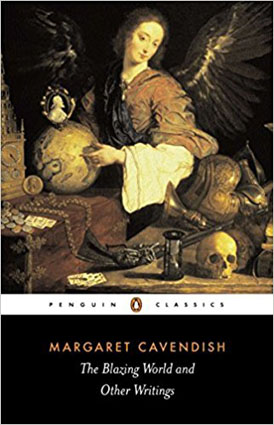Ever since I read Danielle Dutton’s novel “Margaret the First” which fictionalizes the life of Margaret Cavendish and Siri Hustvedt’s extraordinary novel about a misunderstood female artist “The Blazing World”, I’ve had a fascination with this pioneering writer of the 17th century and wanted to read her books. Earlier this year I attended a feminist book club meeting about Dutton’s novel and that reignited my interest in Cavendish. In the lead up to the announcement of this year’s longlist announcement for The Women’s Prize for Fiction, it seemed like a great time to explore this intrepid figure’s writing. “The Blazing World” was first published in 1666 and is often considered a forerunner to both science fiction and the utopian novel genres. It’s a totally bonkers story of a woman who is stolen away to the North Pole only to find herself in a strange bejewelled kingdom of which she becomes the supreme Empress. Here she consults with many different animal/insect people about philosophical, religious and scientific ideas. The second half of the book pulls off a meta-fictional trick where Cavendish (as the Duchess of Newcastle) enters the story herself to become the Empress’ scribe and close companion. It was impossible for me to read this novel without thinking of Dutton’s text which gives an impression of the real struggles Cavendish faced in her life as well as her eccentric personality.
I found the first half of the novel quite difficult to follow although I was entranced by the bizarre concepts and “chopt Logick” that it contained. The Empress is ruthlessly methodical in quizzing her anthropomorphic subjects who are the leaders in their field of study. It’s like she’s investigating the current trends in thought to either approve or reject them. Cavendish was privy to the debates and meetings of some of the most prominent minds of her era so it feels like in her novel she’s mulling over many new concepts and trying to connect disparate ideas. In her wilfulness the Empress demands that telescopes be destroyed because she calls them “false informers” and dissolves her society of Lice-men who are Geometricians because she finds “neither Truth nor Justice in their Profession.” It felt to me like her ruthless decision-making and domineering mentality were Cavendish’s reaction to being made to feel relatively voiceless amongst the egotistical learned men of her time. This could be a simplistic interpretation of her creative reaction and I don’t mean to undermine the seriousness of the ideas Cavendish works with in her novel.
Cavendish explores many fascinating concepts throughout the text concerning the natural world both at the macro level of astrology and the micro level where she seems to be striving to articulate a concept of subatomic physics. In one section she states “both by my own Contemplation, and the Observations which I have made by my rational & sensitive perception upon Nature, and her works, I find, that Nature is but one Infinite Self-moving Body, which by the vertue of its self-motion, is divided into Infinite parts, which parts being restless, undergo perpetual changes and transmutations by their infinite compositions and divisions.” It feels like she’s speaking here about the behaviour of matter and energy and gravitational forces.
As the ultimate leader, the Empress also contemplates how people should be ruled. I found it interesting how she rejects the idea of ruling through tyranny because she recognises its short-term effectiveness: “for Fear, though it makes people obey, yet does it not last so long, nor is it so sure a means to keep them to their duties, as Love.” Not only does she absorb and sift through scientific and political ideas, but also references many different religions and sacred texts to play off from before the Empress decides to write her own religious text or Cabbala. The Empress hilariously wants to summons the spirits of some of the greatest minds in philosophy and science such as Aristotle, Pythagoras, Plato, Galileo or Hobbes, but it’s decided that they would be too “self-conceited” to agree to be her scribe. So instead she summons Cavendish herself. Neither are content to simply reside within this fantastical world so they create worlds within this world to travel to and the Empress appoints a “Spirit to be Vice-Roy of her body in the absence of her soul.”
In the novel there’s a frequent insistence upon the formation of one’s own imaginative world as a means of escape in a way that makes me feel Cavendish must have felt either bored or suffocated by the actual life she was trapped within. It felt as if the Empress’ freedom and vast riches played off from the fact Cavendish’s much older husband experienced varying amounts of financial and political trouble throughout their marriage. Dutton’s novel also suggests how Cavendish had such a restless spirit, boundless level of creativity and a monumental ego that she often felt discontent with the limitations of her reality. She also craved fame and sought it out by dressing outlandishly and self-publishing many books. Cavendish’s taste for fashion and cultivating a distinct image are reflected in the novel as well when the Empress daringly seeks to make a flashy garment made from “star-stone”. I think it’s safe to assume that if Cavendish were alive today she’d be a habitual social media user and would take countless selfies. Everything about her unique and multi-faceted personality suggests that she was someone who struggled with the many limitations of her time.
“The Blazing World” is such an intriguing oddity that I found it a totally absorbing and bewildering read.










